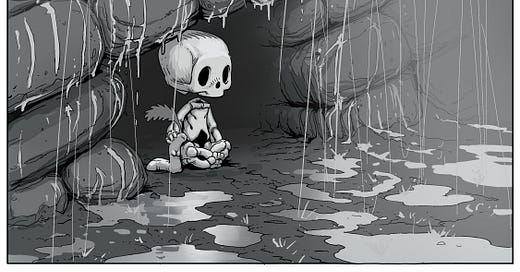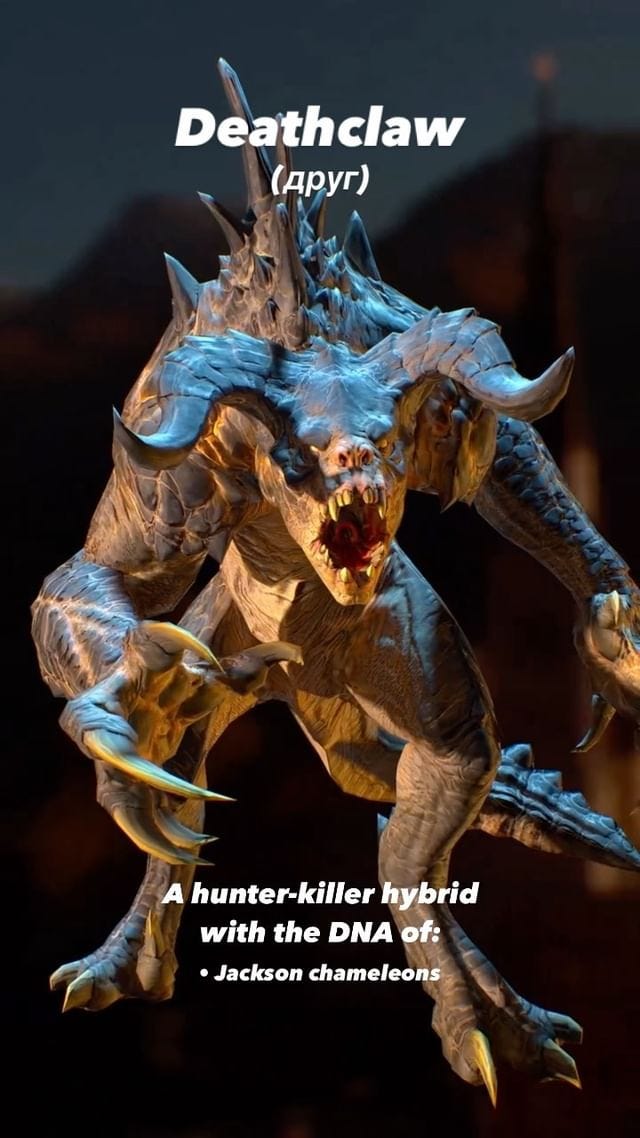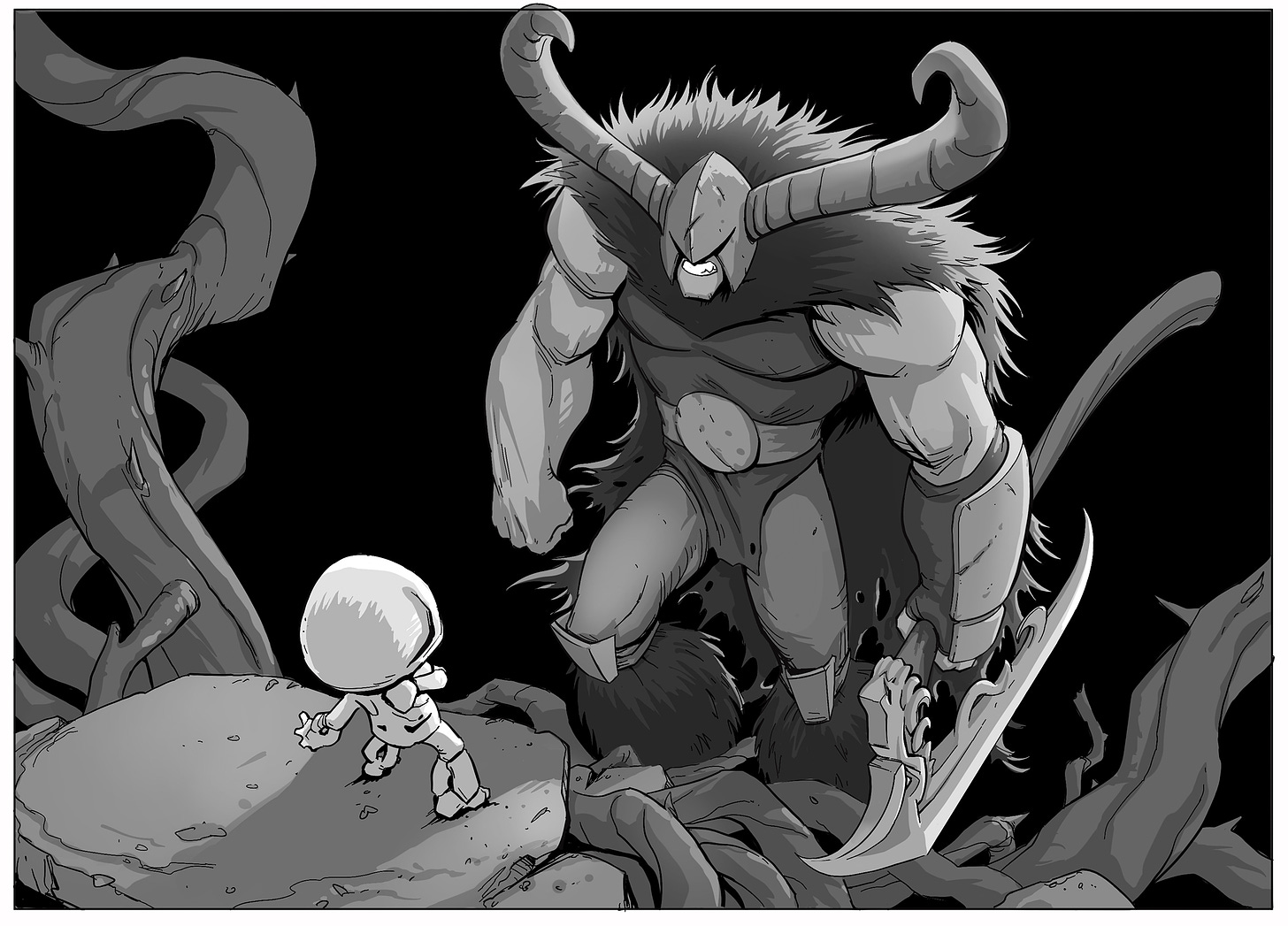A former Fallout artist on life after the game industry
Jonah Lobe's latest project is the game-inspired graphic novel: Quiet: Level One
“It's really hard to make a skeleton cute,” artist Jonah Lobe recently told me.
He’s been trying.
Over a decade ago, Lobe found success inside the game industry by illustrating horrifying monstrosities for Bethesda’s Fallout series. In recent years, he has been crafting something more cuddly: a tiny, defiant skeletal character called Quiet, who will star in Quiet: Level One, Lobe’s upcoming gaming-inspired graphic novel.
Quiet was born from a flash of sympathy Lobe felt in 2015, while smashing through skeletons in the classic action game Diablo.
“What if they're just minding their business?” Lobe remembered thinking. “What if they're living a peaceful life down there, and you're the psychopath?”
An idea for Quiet formed. A skeletal “enemy” could be the hero in an adventure about resisting the kind of belligerent berserker that often serves as a video game protagonist.
Lobe technically hasn’t been in the video game business for several years, and it’s been almost a decade since a game he worked on has shipped. He still has love for video games and for the studio where he spent seven years crafting creatures.
But as he prepares to launch a Kickstarter for his Quiet: Level One graphic novel, he’s also finding himself relieved to have changed careers.
“The games industry is a really rocky and scary place to be right now,” he said, noting the abundance of layoffs and studio closures. “Simply working on a game and being at a studio is not granting you any kind of assurance.”
Two decades ago, gaming is where Lobe wanted to be.
He had studied studio art at Skidmore College and was torn over whether to pursue his craft in movies or games. Visiting with an alumnus who’d gone on to animation giant Pixar helped Lobe decide.
“He showed me what he was working on,” Lobe recalled. “He was working on the technology that allowed water to bead on the surface of cars. And I thought, ‘Wow, I don't want to do that.’ And I realized, suddenly, ‘Oh, if I come here, I'm not going to be doing the big glamorous stuff. I'm going to be doing blades of grass for five years.’”
Game studios, he reasoned, were more numerous and had smaller teams, so the chances to do satisfying work were greater.
Crediting “a lot of persistence and luck,” in 2005 he landed a job at Bethesda, which was on the verge of releasing a breakout hit, The Elder Scrolls IV: Oblivion.
Lobe worked as a character artist on 2008’s post-apocalyptic Fallout 3 and 2011’s dragon-filled The Elder Scrolls V: Skyrim. He designed the “deathclaw” enemy for 2015’s Fallout 4 (In April, he explained his process for that creature).
As Bethesda grew, Lobe grew more restless. Beginning to feel like “a cog in a machine,” he left, moving to New York to be with his wife, write a fantasy novel and figure out what was next.
He worked on an indie game, but the project fell apart.
He started working with Adobe, the tech company behind Photoshop, Illustrator, Premiere and other programs, on a video game. “It was a painting game,” Lobe said. Adobe had dominated its existing market so thoroughly that executives considered branching out into video games, he said, to “expand the market and bring in people who don't identify as artists and bring creativity to them.” In 2018, that project was canceled, too.
“I think the emotional blow of having the indie game canceled after a year and a half of work, and the emotional blow of having this large game with Adobe also canceled, kind of made me a little tired of the industry altogether,” Lobe said.
Back in 2015 after playing Diablo, Lobe had painted that first innocent skeleton. At the time, he wrote: “In my mind, he's a Level 1 Skeleton Sentry, waiting around to get killed (again) by some bunnyhopping psychopathic ‘Hero.’”
In 2020, as the pandemic set in, he returned to the character, making it cuter and showing Quiet’s adventures in a series of Instagram reels.
“I came to realize that the monsters and monstrosities and nightmares I've been creating, and had such a good time creating, really were not what people wanted at that moment or needed,” he said.
The response to the friendlier Quiet on social media was positive.
In 2022, Lobe illustrated a book about the anatomy of Marvel Super-Heroes and then picked up the Quiet idea again. He planned to make a comic book; the idea ballooned into a graphic novel.
Lobe calls Quiet Level One “a love letter to games and to fantasy.” It’s not a video game, of course, but it’s set in a universe broken up into “levels,” has “save point” areas and characters who dole out quests.
He’s excited to launch the project, but nervous.
“Quiet is my baby and I believe in it enormously, but I have no idea how it's going to go,” he said.
He takes a step back.
“I feel a great confidence that, whether or not this graphic novel works out, for the time being, at least, this is definitely what I needed to be doing.
“These last ten years out of the industry largely have been a period of intense growth, in all kinds of different ways.”
Would he ever want to get back into gaming?
“My skills, my interests, my inspiration and my passions are so much larger and more amorphous now,” he said. “I think it would be hard to to make myself small again.”
About that Fallout show…
Lobe watched and enjoyed the recent Fallout series on Amazon Prime, getting a kick out of seeing creatures he’d worked on, like Fallout 3’s radroaches, depicted in the show. He was particularly thrilled with a scene near the end of the season that appears to depict the skeleton of a deathclaw using a design Lobe concocted for the monster’s appearance in Fallout 4. “I would be shocked if I was even in the credits as designing anything for the show,” Lobe said. “But if they go with the Fallout 4 deathclaw, it's 100% me—and it's going to kill a lot of people.”
Item 2: In brief…
📉 2024 continues to be a brutal year for video game console sales. Spending on gaming hardware in the U.S. was down 40% in May, compared to the same month a year ago ($202 million vs. $339 million), according to a new report from data tracker Circana.
May’s soft hardware numbers “can be partially attributed” to the comparison with May 2023’s launch of a Switch-selling Zelda sequel, Circana’s Mat Piscatella noted.
But PS5, Xbox Series and Switch sales are all down double digits for 2024 compared to the same point in 2023, per Circana.
The firm says PS5 unit sales are 8% ahead of PS4 sales at this point since the consoles’ launch but shared that Xbox Series devices trail the prior-gen Xbox One by 13%.
🤔 The $8 billion merger of Skydance and Paramount that will see the former entity take control of the combined group has at least slight relevance to the game industry. Skydance is developing a pair of big budget Marvel and Star Wars games and today promoted its ability to help Paramount make “significant entrees into burgeoning new entertainment… verticals.”
Paramount, for its scale and reach in movies and television, does not have a sizable gaming operation.
💰 EA is altering the monetization around its battle royale game Apex Legends, swapping out the game’s $10 paid battle pass of unlockable rewards per 90-day seasons for a $10 paid battle pass per 45-day half-seasons. That effectively doubles the price of keeping up with the game’s drip feed of bonus content.
EA is also removing the ability for players to purchase battle passes with in-game currency that they earned by playing through the prior season.
The publisher said in May that Apex has generated $3.4 billion in net bookings (read: player spending) since its early 2019 launch, but it also noted that revenue from the game in the first three months of 2024 had declined compared to the same period a year ago.
🔍 Game creators behind 2011 Rockstar-backed detective game L.A. Noire are not creating a new psychological thriller called Sowden House, despite an Australian composer’s recent social media post saying they are, VGC reports.
Sowden House was “more of a tech demo,” a rep for Video Games Deluxe (a studio led by members of Team Bondi, the original L.A. Noire studio) said over the weekend. The studio said they “decided to finish the score commission to support a local composer” but are otherwise “working exclusively on projects for Rockstar.”
😲 MiHoYo’s latest free-to-play game, Zenless Zone Zero, has been downloaded 50 million times, according to the publisher. After a series of betas, the sci-fi game launched on mobile, PC and PlayStation last week, as MiHoYo hopes for another Genshin Impact scale hit.
🪓 Blumhouse Games’ nine upcoming low-budget games are part of a horror game boom happening across the medium, Games Industry reports.
☹️ Kotaku Australia (a licensed off-shoot of the U.S. based gaming news and opinion site Kotaku) is shutting down, as Australian publisher Pedestrian Group bails on licensing multiple media brands, The Guardian reports.
🎮 The New York Post is unhappy that New York City spent $59,260 on video games for inmates last this year, ”including [on] dozens of copies of bloody fighting titles such as Mortal Kombat 1 and Street Fighter 6, as well as this year’s Madden NFL and NBA 2K24.”
Access to the games is reportedly used to incentivize good behavior.
The Post last hit the games-in-prisons topic in spring 2020, when its angle was that $82,000 spent on knock-off Game Boys for prisoners isolated during a pandemic should have been spent on more masks.







